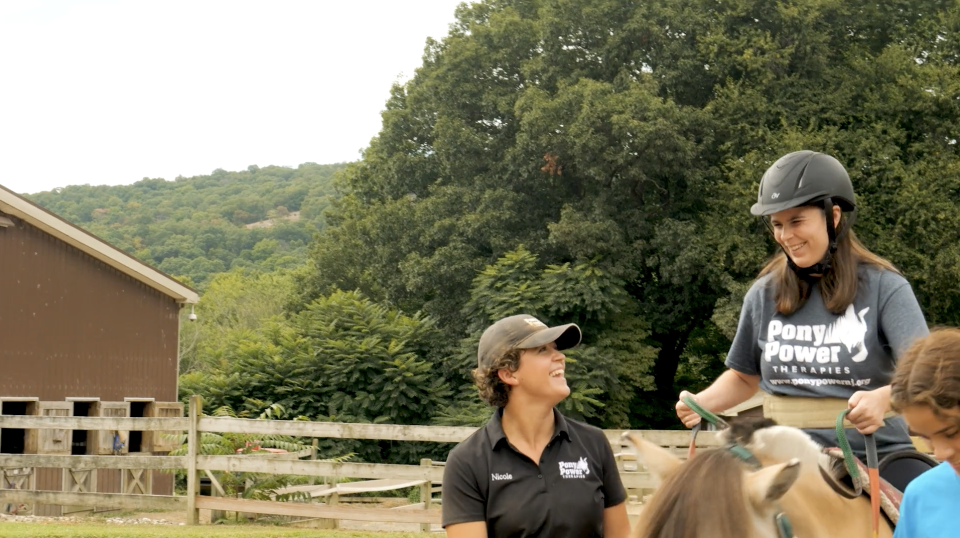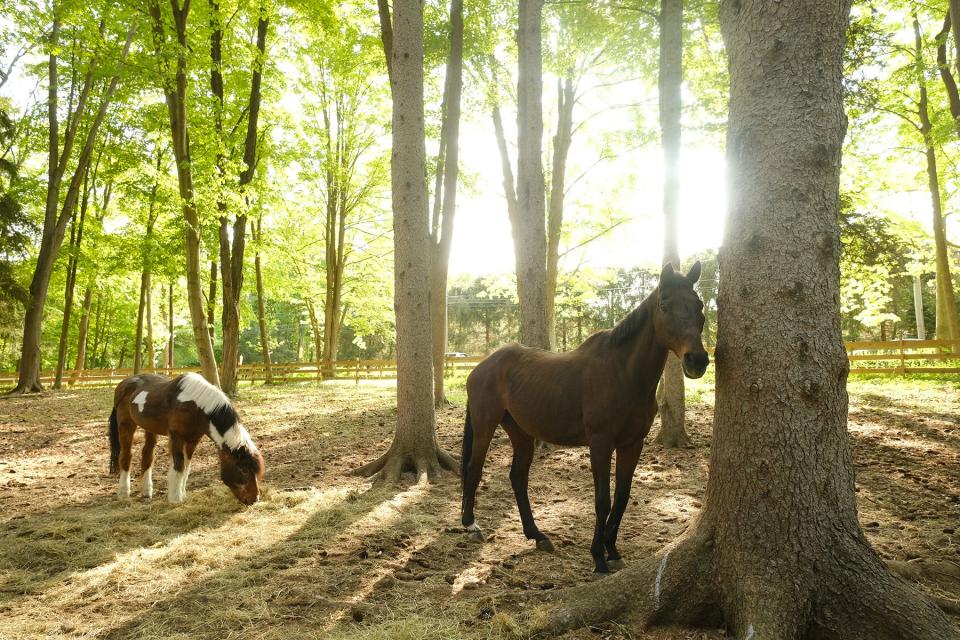For 20 years, North Jersey horse farm has helped riders with disabilities hit their stride
For years, Glen Rock’s Allie Dalstrom has grappled with Charcot-Marie-Tooth, a disease that results in muscle weakness. The 26-year-old relies on metal ankle braces to steady her body and help her feet hit the ground in the right way.
The disease’s progressive nature has given Allie a use-it-or-lose-it approach to life. She walks and swims daily, and when her physical therapy came to a halt during the pandemic, her mom, Rainy, found another way for Allie to keep moving: horseback riding.
Twice a week she headed to Pony Power Therapies, a 13-acre "fully accessible" nonprofit farm in Mahwah that owner Dana Spett created 20 years ago for people with disabilities so they could reconnect with nature and experience its therapeutic benefits.
It's there that Allie Dalstrom’s horseback-riding lessons begin at the bottom of a ramp that leads her up to Remy, a 16-year-old Norwegian fjord. The palomino has a black dorsal stripe that streaks down its mane and back.

The treatment offered at Pony Power is premised on the curative sensations imparted to riders by the natural gait and movement of horses. When Dalstrom perches on Remy’s back, their spines align, said Spett, a social worker by trade. That engages core muscles that Dalstrom needs to keep strong for stability and balance.
Dalstrom's doctor suggested she work with horses. Although riding is “a different experience from traditional therapies,” it can provide the kind of workout that many with cerebral palsy or CMT need, Spett added.
The owner, a lifelong equestrian, said she started the business out of necessity.
One of Spett’s three daughters was born with a “sensory integration dysfunction” (Spett declined to be more specific) and she thought therapeutic horseback riding would be helpful.
“I had the idea to start this program and rented a stall without knowing which horse we would bring,” she said. “We found and rented a stall for a horse in Paramus. At the time, my family and I were living in Fair Lawn.”
In 2000, a friend pointed the family to a horse named Mat, a gray Selle Français warmblood with “a wonderful temperament” who had recently retired from his show jumping career.
Two decades later, Power Pony has become a sanctuary for people seeking physical, emotional and cognitive growth, said Spett, who recently earned a doctorate in social work from Rutgers University. The farm currently has 24 staff members and 100 volunteers serving an estimated 200 clients per week,
Spett was sold as soon as she saw how much horse therapy helped her daughter. Inspired to offer the benefits to others in need, she purchased a farm in Mahwah in 2003 and constructed the campus on Ramapo Valley Road that is now home to 22 horses and ponies, nine chickens, four sheep, three goats, three beehives and two pigs.
That's the view Dalstrom enjoys from atop Remy, whom she calls a “sweet and cooperative” horse who will “tolerate anything.”
A horse’s silence is often an asset, Spett said, especially with riders on the autism spectrum.

“When you interact with a horse, they respond to your energy and body language, much like humans,” Spett said. “However, horses don't understand specific language. This makes them effective facilitators for communication, especially for individuals who have barriers in expressive or receptive language skills.”
Five years of riding has strengthened Dalstrom's core muscles, as her mother had hoped. It has also provided a sense of relaxation and eased her fear of falling, which tends to happen when you have a mobility disability.
"Pony Power has literally changed my life in so many ways," Dalstrom said.
That includes "the obvious ways: confidence, strength, skills and balance." But the farm, Dalstrom said, has also given her a new sense of purpose. She recently became a member of Power Pony Therapies' event committee and said she's looking forward to giving back to the organization that has done so much for her.
More: Would your pup make a good therapy dog? Morristown hospital offers advice for pet owners
Over the years, Spett has partnered with disability specialists, including Bergen County's CTC Academy, a nonprofit based in Oakland that offers educational and therapeutic services to students with developmental disabilities. Together, CTC and Pony Power have developed a variety of programs that promote life skills, including horse care and activities conducted in the farm's greenhouse.
The goal is to be there for anyone who needs it, Spett said. That includes a class of clients that has grown recently, she said: people with so-called invisible disabilities.
“We're finding, especially during COVID, that there's a lot of anxiety, a lot of school avoidance, long COVID. There are just so many new things that are cropping up. So we consider disability in the broadest terms possible,” Spett said.
For more information, visit ponypowernj.org.
Gene Myers covers disability and mental health for NorthJersey.com and the USA TODAY Network. For unlimited access to the most important news from your local community, please subscribe or activate your digital account today.
Email: myers@northjersey.com
Twitter: @myersgene
This article originally appeared on NorthJersey.com: Mahwah NJ horse farm uses hippotherapy to help riders with disabilities

